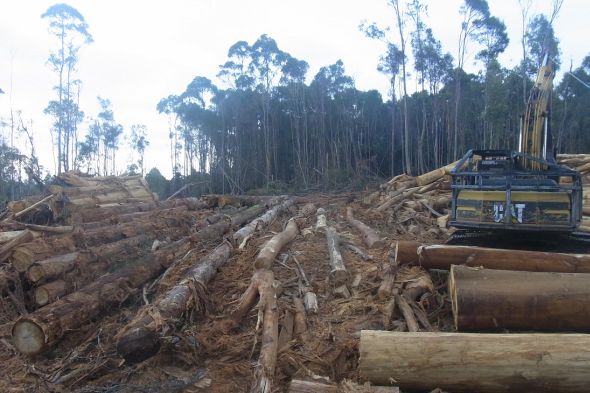
Clearfelling old growth forest in Tasmania. Previously destroyed for woodchips, native forests are now in danger of being burned to create electricity.
Reports that the owner of Victoriaâs Hazelwood coal power station, GDF Suez, has been considering plans to convert it into a co-firing facility, allowing it to burn native forest waste as well as brown coal, have been slammed by environmentalists.
As Australiaâs dirtiest power plant, Hazelwood has been seen for some time as a likely candidate for closure. Now, , its French owner is trying to reinvent it as a âclean energyâ operator by burning native forests.
program reported on July 24 that Hazelwood owner GDF Suez had conducted a number of trials of native biomass burning over the past decade, as part of âhighly secretâ plans to clean up the La Trobe Valley power plant.
A spokesperson for GDF Suez told the ABC the trials had âvarying degrees of successâ and that the company had not yet chosen to proceed any further with them.
GDF Suezâs parent company, Energi, has recently overseen a coal plant conversion to biomass project in Belgium.
Greens forest spokesperson Senator Janet Rice said that replacing one dirty power source for another was âlike quitting cigars by taking up cigarettesâ.
âBurning wood from native forests for energy is neither clean nor renewable.
âWe now have proof that the deal between Labor and the Abbott government could see Hazelwood become even more destructive.â
The recent bipartisan agreement to cut Australiaâs Renewable Energy Target (RET) to 33,000GWh allowed the burning of native forest âwood wasteâ or biomass to be credited as renewable energy.
The addition of wood waste into the RET was criticised by many environmentalists as not being renewable and for taking already limited capacity away from solar and wind. But it was argued at the time that biomass used for electricity would be a âvery small amount,â and would only ever be a âlocalised industryâ.
Nathan Trushell from VicForests agreed. He told the ABC the economics of converting a plant like Hazelwood were âvery challengingâ when you look at the cost of transporting heavy wood long distances, compared with cheap brown coal.
He said: âI want to reinforce that we don't see that as being the main opportunities for bioenergy in the space that we operate in, at least in the short to medium term.
âI think really the opportunities again are in small-scale, localised energy production and I think the technology is getting close.â
But Parliamentary secretary for agriculture, Senator Richard Colbeck, supports any plan for Hazelwood to co-fire forest biomass with brown coal.
He told the ABC: âIf we're genuinely looking at replacing coal with other, less emitting forms of energy generation, those are things that can and should be considered.
âIf you look at that area, there is a significant forest industry. They would be generating certain volumes of waste out of that industry and if that can be properly put to good use as part of a reconfiguration of that power plant, why not?â
Senator Rice has a reason: âAll the science is telling us that we must end our reliance on coal to reduce the impacts of climate change, but this must not come at the expense of our native forests,â she said.
âTo get serious about storing carbon and reducing the impacts of climate change, we must stop logging our native forests, not encourage their destruction.
âWe urgently need to replace Hazelwood with actual clean energy like wind and solar, as Labor promised to do in 2010.â
Like the article? Subscribe to Â鶹´«Ã½ now! You can also us on Facebook and on Twitter.